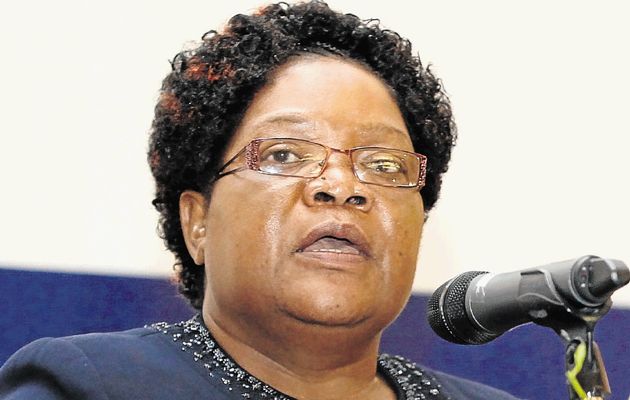
WAR VETERANS minister Christopher Mutsvangwa has heaped praise on former Vice-President Joice Mujuru for her role in the liberation struggle, though last year he was the first to dispute claims she downed an enemy helicopter during the war.
BY OBEY MANAYITI
Mutsvangwa was at the forefront of the campaign to unseat Mujuru last year and his latest remarks while addressing journalists at the Quill Club during a Samora Machel 2015 lecture on Monday indicate an immense volte-face.
The War Vets minister said he had utmost respect for Mujuru for the role she played during the liberation struggle.
“She was there. I saw her [and] we were together in that war and I respect her for that,” he said.
“She took part. I never dispute that she was my commander and she was the first woman I saw who was trained. I hadn’t trained because I was coming from university. I have never stopped respecting her for that aspect.”
Unsurprisingly, Mutsvangwa’s remarks come a week after war veterans were at the end of a tongue-lashing from First Lady Grace Mugabe, who said participation in the liberation war was not a passport for “wayward behaviour”.
Mujuru gained fame for reportedly gunning down a Rhodesian helicopter, but this has been disputed heavily by the likes of Mutsvangwa.
- Chamisa under fire over US$120K donation
- Mavhunga puts DeMbare into Chibuku quarterfinals
- Pension funds bet on Cabora Bassa oilfields
- Councils defy govt fire tender directive
Keep Reading
Mutsvangwa’s claims against Mujuru came at a time the ruling party had launched a spirited campaign to elbow her out of Zanu PF and the presidium ahead of last year’s congress in December.
The campaign involved Grace.
Mutsvangwa said war veterans had received financial support from the United Nations Educational, Scientific and Cultural Organisation to put up a corroborative narrative about the liberation struggle so that those who gave “false” accounts would be exposed.
“This was not a war for individual heroism,” he said.
“I didn’t survive in the war because I was smart, but because the other guy on my side shot the guy who wanted to shoot me. I am so humbled that I survived. I am not going to claim any heroics about that war.
“This is total disrespect of the other comrades who didn’t come back because you are claiming you survived because you were exceptional. That was not it. Let’s be honest because this is an emotional issue.”
Turning to the security sector reform, Mutsvangwa said those trying to push for change were misguided because that area was closed.
He said the military would not stage a coup like what Idi Amin of Uganda did in 1971.
“Security sector reform, if it means accommodating wayward tendencies, then no, it will not come,” Mutsvangwa said.
“You can’t say you want to change this sector. No! Find other things to do.
“That area cannot be reformed. There is so much discipline there and please don’t ever think that you will hear at one point just like Amin did to just come up and say he is assuming power.
“We give you political freedom and please don’t try to change the State born in 1980 out of the liberation war. We will not accept other elements.”
The military is often accused of being partisan and interfering in civilian political processes, triggering calls for reform.
Recently, Commander of the Presidential Guard, Brigadier-General Anselem Nhamo Sanyatwe, reportedly told soldiers under him to ensure that Mujuru’s political ambitions were thwarted, another example of interference.
Sanyatwe, however, later claimed he was misquoted.
Mutsvangwa said Machel did an immense job in inspiring and handholding the freedom fighters during the struggle.
“If you want to understand, the impact of Samora Machel is the ability to organise a military victory against your oppressor, because, for the first time, you could show that you are virile like any other race,” he said.
“Before Machel, there was a perception of the European as invincible and the African as an indigent sub-human.”











